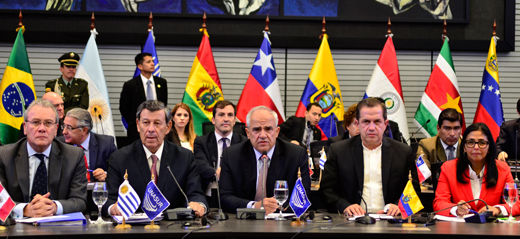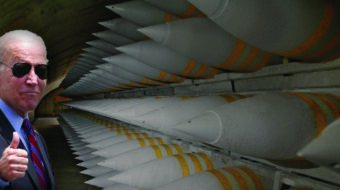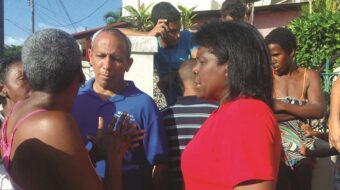
The Union of South American Nations (UNASUR) has called on President Obama to revoke sanctions he imposed by executive order March 9 against Venezuela.
The group, which represents every single country in South America, said the president’s order constitutes a “threat of interference” against Venezuela’s sovereignty and that it violates the principle of non-interference in the affairs of other states.
President Obama, earlier this month, announced a “national emergency” because of a supposed danger to “U.S. interests and foreign policy” posed by Venezuela. His executive order imposes harsh sanctions against seven citizens of that country.
The call for revocation by UNASUR is seen as important because the organization is much more than just a trade bloc or customs union. This body, which includes Argentina, Bolivia, Brazil, Chile, Colombia, Ecuador, Guyana, Paraguay, Peru, Suriname, Uruguay and Venezuela, is a vital building block in attempts to improve the well-being of the peoples of the South American continent. Its aim is to increase trade and mutual solidarity among the twelve independent member states.
UNASUR partners with several other international organizations, including MERCOSUR (Market of the South), CELAC (Community of Latin American and Caribbean States, which includes every independent country in the Western Hemisphere except the United States and Canada) and ALBA (Bolivarian Alliance for the People of our Americas), among others. Together, the UNASUR states have about 390 million inhabitants.
UNASUR projects currently include the Bank of the South, which participating countries hope will eventually provide an alternative to the International Monetary Fund and the World Bank for countries seeking development aid without “neo-liberal” strings attached in the form of requirements for austerity, privatization and “free” trade. Also there are efforts to create a single South American citizenship so that people who need to move to find work will not even need passports or visas to do so.
The prospects of UNASUR and the other multinational “Bolivarian” groups are so enticing that even countries with right-wing governments allied with the United States participate in the grouping. So alongside the radical governments of Venezuela, Bolivia and Ecuador, UNASUR includes left-center governments such as those of Argentina, Brazil, Chile and Uruguay, and right-wing regimes allied to the United States, namely Colombia, Peru and Paraguay.
There are some conflicts within UNASUR. There are territorial disputes between Bolivia and Chile over access to the Pacific Ocean, taken away from Bolivia at the end of the “War of the Pacific” (1879-1883), and a long running one over border territories between Venezuela and Guyana. But UNASUR has developed such authority that it has been able to play a valuable mediating role in disputes between South American countries.
Now UNASUR has raised its voice about the issue of Venezuela. At the request of the Venezuelan government, UNASUR has helped with that country’s current difficulty in three ways: It has laid plans for new trade initiatives to help Venezuela overcome some shortages of food staples, it has offered to help mediate friction between the government of Nicolas Maduro of the United Socialist Party of Venezuela and his right-wing opponents, and now it is stepping into the dispute between Venezuela and the United States.
UNASUR has instructed its Secretary General, Ernesto Samper, a former president of Colombia, to go to Venezuela and start talking to both the Maduro government and the major oppositional forces. The urgency of Samper’s mission was heightened on February 12, when the Venezuelan government announced the nipping in the bud of a plot to overthrow it with foreign, probably U.S. and British support, and the arrest of a number of people for their involvement, including Antonio Ledezma, the right-wing mayor of metropolitan Caracas.
Given the history of coups and destabilization which has characterized the relationship of the United States to the countries of Latin America, many immediately asked themselves if Obama’s action might portend something more drastic, up to and including armed intervention.
For this reason, the Venezuelan government asked for a special UNASUR meeting in Quito, Ecuador. This meeting took place on March 15, with all 12 UNASUR member states present.
The meeting voted unanimously, without even the pro-US countries dissenting, to denounce the March 9 statement from President Obama and ask for its retraction.
UNASUR Statement (Unofficial translation):
“The member States of the Union of South American Nations (UNASUR) manifest their rejection of the Executive Order issued on March 9, 2015 by the government of the United States of America, for it constitutes a threat of interference against sovereignty and the principle of non-intervention in other States’ affairs.
“The UNASUR Member States ratify their commitment with the application of International Law, Peaceful Resolution of Disputes and the principle of Non-Intervention, and calls upon governments to withhold the use of coercive unilateral measures that violate international law.
“UNASUR reiterates its request to the United States’ government to evaluate and implement dialogue with Venezuela as an alternative, under the basis of respecting sovereignty and self-determination of the people. Consequently, we request the derogation of the Executive Order.”
Samper made it clear that in his view the peace of the South American continent is endangered when the sovereignty and constitutionally established institutions of any country are interfered with from outside. Previously, the governments of Argentina, Bolivia and Ecuador had spoken out strongly against the U.S. policy, as did the governments of the People’s Republic of China, Cuba and the Russian Federation. Demonstrations against the U.S. policy were carried out in several countries.
Photo: UNASUR, March 15, Flickr.

MOST POPULAR TODAY

High Court essentially bans demonstrations, freedom of assembly in Deep South

U.S. imperialism’s ‘ironclad’ support for Israel increases fascist danger at home

Resource wars rage in eastern Congo, but U.S. capitalism only sees investment opportunity


UN warns that Israel is still blocking humanitarian aid to Gaza






Comments